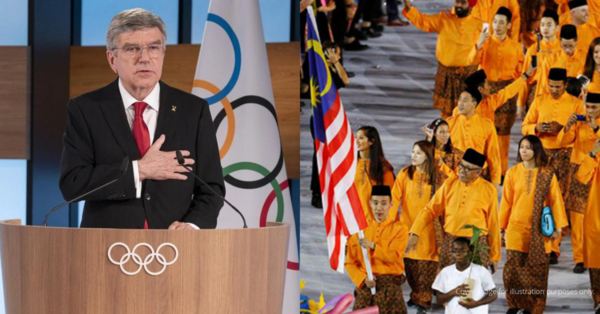Subscribe to our Telegram channel for our latest stories and breaking news.
International Olympic Committee (IOC) president Thomas Bach has promised that the upcoming Tokyo 2020 Olympics will be “safe and secure” amidst the pandemic
Bach, who met with Japan prime minister Yoshihide Suga on Wednesday, 14 July, said that the IOC has agreed to cooperate with the government to minimise COVID-19 related risks to the country.
“It is essential for the success of the Games for all parties concerned to take appropriate action. I hope that the IOC, as the organiser of the Games, will make every effort to ensure this,” Suga was quoted as saying by The Japan News.
Concurring with the prime minister, Bach – who last December won his second term as IOC president unopposed – promised that measures will be implemented to avoid bringing “any risks to the Japanese people”.
He said that strict coronavirus measures were in place, and that “they are enforced and they are working”.
The IOC chief also claimed that at least 85% of the participating athlete delegations will have been “vaccinated or immune”, including virtually all IOC staff and officials, according to a report by The Guardian.
IOC president Thomas Bach.
Image via Reuters/Malay Mail
Concerns have been mounting after at least three national contingents had to self-isolate following their close contact with COVID-19 positive cases
The discovery of a coronavirus cluster amongst hotel staff in Hamamatsu city, south-west of Tokyo, had forced 31 members of the Brazilian Olympic delegation staying there to be separated from other guests.
The cluster, which was identified after seven staff at the hotel tested positive for COVID-19, had increased concerns over potential outbreaks throughout the upcoming Olympics.
Relatedly, the majority of the South African rugby team had been put into self-isolation in nearby Kagoshima, after a close contact on their flight to Tokyo was believed to have tested positive for the virus. The same was imposed on the Russian women’s rugby team, after the team’s masseur became infected.
Tokyo recorded 1,149 new cases of COVID-19 on Tuesday 13 July, the highest it has been for almost six months. This number is just shy of the all time high of 1,184 cases, reported on 22 January.
Athletes will be required to observe a strict “bubble system” and undergo COVID-19 tests daily.
Image via Junichi Sasaki/Mainichi
The IOC president went on to highlight the significance of this edition of the Games, calling it a global show of solidarity
Bach stressed that despite being held behind closed doors amidst soaring infections, the Tokyo Olympics will serve as a global show of solidarity amidst the ongoing pandemic.
“These will be a historic Olympic Games, for the way the Japanese people overcame so many challenges in the last couple of years, the great east Japan earthquake and now the coronavirus pandemic,” he said.
“Billions of people around the globe will be glued to their screens and they will admire the Japanese people for what they have achieved under these very difficult circumstances.”
Tokyo had been awarded the hosting rights to the games back in 2013, two years after the country experienced a historic earthquake, tsunami, and subsequent triple nuclear meltdown in neighbouring Fukushima.
It will become the first Asian city to host the Olympics twice, doing so for the first time in 1964.
The 68,000 capacity National Stadium was used as the main venue for the 1964 Games, and was rebuilt in the lead up for Tokyo 2020.
Image via Olympics


